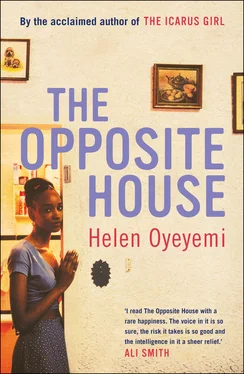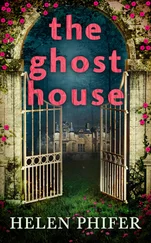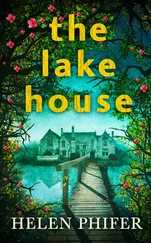Helen Oyeyemi - The Opposite House
Здесь есть возможность читать онлайн «Helen Oyeyemi - The Opposite House» весь текст электронной книги совершенно бесплатно (целиком полную версию без сокращений). В некоторых случаях можно слушать аудио, скачать через торрент в формате fb2 и присутствует краткое содержание. Год выпуска: 2008, Издательство: Bloomsbury UK, Жанр: Современная проза, на английском языке. Описание произведения, (предисловие) а так же отзывы посетителей доступны на портале библиотеки ЛибКат.
- Название:The Opposite House
- Автор:
- Издательство:Bloomsbury UK
- Жанр:
- Год:2008
- ISBN:нет данных
- Рейтинг книги:4 / 5. Голосов: 1
-
Избранное:Добавить в избранное
- Отзывы:
-
Ваша оценка:
- 80
- 1
- 2
- 3
- 4
- 5
The Opposite House: краткое содержание, описание и аннотация
Предлагаем к чтению аннотацию, описание, краткое содержание или предисловие (зависит от того, что написал сам автор книги «The Opposite House»). Если вы не нашли необходимую информацию о книге — напишите в комментариях, мы постараемся отыскать её.
The Opposite House — читать онлайн бесплатно полную книгу (весь текст) целиком
Ниже представлен текст книги, разбитый по страницам. Система сохранения места последней прочитанной страницы, позволяет с удобством читать онлайн бесплатно книгу «The Opposite House», без необходимости каждый раз заново искать на чём Вы остановились. Поставьте закладку, и сможете в любой момент перейти на страницу, на которой закончили чтение.
Интервал:
Закладка:
They walk; the wind is polite and dusts the playthings of other days from their path. Tayo lights a cigar and blows smoke at the ground. High on his cheeks, his eyelashes form fringed crescents. Aya asks of Amy, and Tayo lets his cigar fall and by so doing murders it; its battered head smoulders and collapses. Amy is in hospital, he says, because she tried to die.
* * *
The beds on the ward are narrow and high. Iron bedsteads. Everybody lies down obediently and in exactly the same way; people who slept on their sides or their stomachs at home lie on their backs here, stiff. No bed is near a window, no one has a view. A giant Pinocchio lopes in red, yellow, pink and brown along the back wall, interrupted by a heavy door that stands, unperturbed, in his stomach.
Amy, her hair dropping in a multitude of coils from a single, burnished bun, beams from amongst her pillows when she sees Aya and Tayo, though she could be smiling at the gifts — a carton stuffed to overflowing with red grapes, and sunflowers whose tawny heads double the size of her palms.
Amy hugs Tayo, Aya, the fruit and the flowers simultaneously. The pain on her cheeks, her forehead, her hands, stands out blackly, as if her veins are delicately weeping poison and her skin is a cloth placed over it to soak up the damage. The girl in the bed next to Amy’s is asleep. She has a sharp little face, like a baby bird’s, and she cannot walk because her spirit does not want her body and bids it disappear. Beneath the girl’s covers, atrophied muscle makes her legs lithe and kneeless. The girl’s mother sits beside her, reading the newspaper to herself.
Tayo slowly kneads Amy’s hands between his own; it reminds Aya of her Mama. But Amy turns away from him, turns into her pillow. Her body curls up, foetal. She hides in her hair and quietly, quietly coughs out gummy streams of pale green. The nurses gently move her to a new bed. Amy’s silk handkerchiefs still cluster over and under the brown leather belt she’s tightened around the waist of her nightie, but Aya gives her a tissue; she dabs feebly at the sores that now show starker beside her mouth.
Aya asks her, ‘Amy, why?’
(How can you know my name and want to die?)
Amy says, ‘I don’t know. It was just an idea, really.’
Aya cannot stop looking at the beautiful bird-girl in the bed next to Amy’s; the girl sleeps even though the blankets are too heavy for her, even though her mother’s sad hand on her pillow is too heavy for her.
Aya cannot stay. This place is not a place that she understands, and Amy knows that. She kisses Aya and says to her, ‘It has been good to see you again, Yemaya Saramagua.’
11 1 % thanatos instinct, 99 % air
Amy Eleni’s flat is a deconstructed chest of drawers — all on one level, all as is to be expected. The medium-sized sitting-room box sits in between the medium-sized kitchen box and the bedroom, with its high double bed and the black television and VCR on the table beside it. In the sitting room is a non-scent, a pale, clean sofa, light curtains. There is waiting-room magic here, a polite insistence that these rooms are in fact a space you pass through on your way to somewhere else. You’re not to trouble yourself to look at the walls, since there are no pictures there. You’re to wipe your feet, but keep your shoes on.
You would never guess that Amy Eleni is a teacher. Actually, you wouldn’t guess anything about her; you’d think she was suicidal and had given most of her stuff away.
Amy Eleni doesn’t buy books; she buys shoes instead. She takes books out from the library — ten at a time — and lives on them, around them, all over them. She spilt coffee all over a library book and said to me, ‘See? Me and books — I’d better not even try to live with them. Life is over there, behind the shelf.’
Amy Eleni doesn’t have a shelf in her flat. So, because I had no idea what she was talking about, I was immediately suspicious that her hysteric had her. But before I could say anything, Amy Eleni jumped on me, smothered me with her hands and shouted, ‘Why are we friends? You really need to read —’
I surfaced and covered her face with my hand.
‘Shut up! I’m not taking any more recommendations!’
Melded together on her sofa, drunk on Fragolino and watching TV, Amy Eleni caught me peering around, in a mood to dismiss, thinking, How bare this place is .
She said, ‘Look, I just don’t have a lot of things.’
For this week’s showing of Vertigo , Amy Eleni is wearing a smooth grey pencil suit and heels, entertaining me with the reminder that, apart from the fact that they’re both blonde, she looks nothing like Madeleine Elster, the doomed woman in the film. Madeleine Elster is sleek and taut, like one long nerve at red alert, and Amy Eleni is short and of far softer stuff, all whirls and coils and curves, her hair, her body, the gradations of colour in her irises. Madeleine Elster looks a little more like Amy Eleni’s mother. Amy Eleni goes to make us some Horlicks, calling from the kitchen that she’s adding soymilk to mine because it’s supposed to be good for developing bones and teeth and stuff.
‘I would’ve thought that would be cow’s milk,’ I say, watching the opening scenes of the film: Scottie’s fall; his resulting trauma; the way it seems he can’t even look down at his own feet without seeing swirls.
‘I teach English. .’ Amy Eleni reminds me.
‘Give me cow’s milk, woman.’
In the voice she reserves for creepy coincidences, Amy Eleni says, ‘Imagine if that baby wasn’t a baby at all, and that this is one of those strange pregnancies you read about in the Fortean Times? What if all you’ve got in your stomach is this limp piece of dough and it just keeps expanding until — boom?’
She’s joking, but I don’t like it. I feel cold.
‘Don’t say that!’
‘What?’ Amy Eleni comes back in and hands me my Horlicks.
‘What?’ she says again, when I take it without saying anything. I sniff at the mug, as if my nose can tell me the difference between soymilk and cow’s milk, as if my nose can tell me which is better.
In the evening, I use a hand mirror to supervise my earrings. I boil tonight down to flip-switch decisions: hoops or dangly earrings; long skirt or black dress; to sing well or to sing badly; to tell Aaron now that I’m going to Cuba next month, or to put it off until I can sound sane when I say it. I’ve missed band rehearsals and Michael is pissed off at me, so I have to be early tonight. Aaron is in the kitchen cooking up a batch of jollof rice; I hear him hissing as the onions sizzle. He isn’t fully aware of his kitchen soundtrack, his tendency to imitate food sounds.
‘You shouldn’t cook — you’re tired,’ I tell him, watching the clock. ‘I could have made you something.’
He comes out of the kitchen expressly to point his spatula at me. ‘But I want jollof rice, and you can’t cook it. Anyway, you should eat some of this,’ he says, ‘it’ll be good for our boy.’
I suck my breath in, find lightness to speak with. ‘Who says it’ll be a boy?’
‘I knew you’d say that,’ Aaron sings. I am supposed to want a girl child; he is supposed to want a boy child.
The phone rings. It’s Amy Eleni, and I’m immediately stricken with guilt for not having called her first. She says, ‘Oh, hi Maja. Is Aaron around?’
She doesn’t sound cold or angry at me, just busy. I think. Or maybe she is angry. I pass the phone to Aaron and wander around looking for my shoes, thrown off course by the call, trying unsuccessfully to listen in.
Aaron comes back into the sitting room, hangs up the phone and sighs. ‘There goes my free Sunday afternoon — I was going to try and sleep right through it,’ he says.
Читать дальшеИнтервал:
Закладка:
Похожие книги на «The Opposite House»
Представляем Вашему вниманию похожие книги на «The Opposite House» списком для выбора. Мы отобрали схожую по названию и смыслу литературу в надежде предоставить читателям больше вариантов отыскать новые, интересные, ещё непрочитанные произведения.
Обсуждение, отзывы о книге «The Opposite House» и просто собственные мнения читателей. Оставьте ваши комментарии, напишите, что Вы думаете о произведении, его смысле или главных героях. Укажите что конкретно понравилось, а что нет, и почему Вы так считаете.












